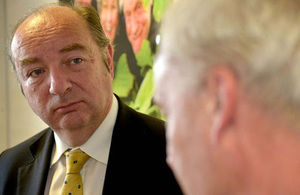Ending Gang and Youth Violence: government programme expanded
The coalition government has announced 10 new areas which will receive specialist support to tackle gang-related crime.

The areas, all in England, will be included in the government’s Ending Gang and Youth Violence programme after they requested access to the scheme’s resources and expertise.
They join 33 areas already benefiting from the programme.
Ending Gang and Youth Violence: government programme expanded.
The new priority areas, five of which are London boroughs, are: Barnet; Bromley; Havering; Hillingdon; Kensington and Chelsea; Luton; Ipswich; Thanet; Stoke-on-Trent; and Tendring.
They will work with the programme’s network of more than 70 people with frontline experience of dealing with gangs to develop a coordinated response to issues faced on the streets.
Problems which need to be addressed include drug dealing by gang members travelling from other areas. This is often due to better enforcement activity in existing priority areas, resulting in criminals going elsewhere.
Crime Prevention Minister Norman Baker said:
The coalition government’s sustained effort to tackle gang activity is delivering real results. Supported by our network of advisers, our priority areas have developed mentor-led projects that are rescuing young lives from a bleak future blighted by violence and exploitation.
Local areas are better equipped than ever before to tackle gang violence and to offer the right support to help young people leave gangs.
It is vital our response to gang culture tackles emerging problems, such as drug dealers crossing boundaries to commit crimes elsewhere.
I’m pleased those areas experiencing problems associated with street gangs approached the government for help, and that we are able to extend our support to them.
Together we can end the scourge of gang activity, which ruins young lives, devastates families and terrorises communities.
The coalition government’s Ending Gang and Youth Violence strategy aims to prevent young people getting involved in gangs, help those caught up in them to leave, and enable the police to take tough action against those who refuse support and continue to offend.
In addition to the work of the network of advisers with the priority areas, the government has also provided £1.2 million for young people’s advocates to support young women affected by gang-related violence or exploitation.
Funding boost for pilot project
And today the Minister also announced Home Office funding of £30,000 to expand a pilot placing youth workers in A&E units in London.
The investment will enable the Redthread charity to install youth workers at A&E departments at St Mary’s, St George’s and Royal London hospitals, building on the pilot at King’s College Hospital.
Youth workers based within A&E units offer support to teenage assault victims, helping them to avoid becoming involved in, or to withdraw from, gang activity.
Earlier this year the Home Office funded specialist training for the NSPCC - the charity’s helpline practitioners now offer advice, support and information on what action someone can take to help young people who might be in or at risk from a gang.
If you are worried that a child may be at risk, you can contact the 24 hour helpline anonymously on 0808 800 5000 or email help@nspcc.org.uk.